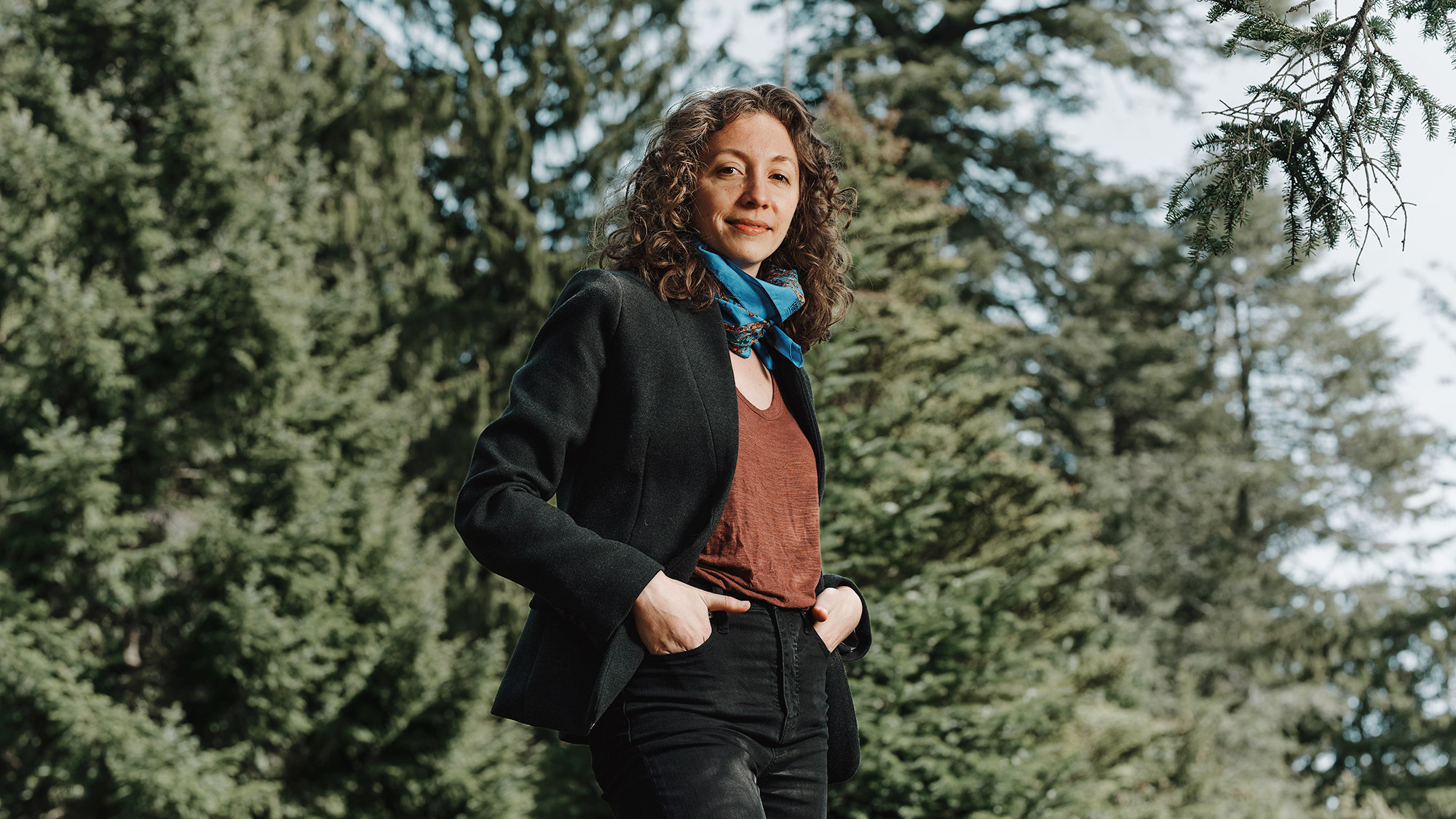Foray Bioscience is opening up possibilities for biomanufacturing in forestry.
By Abdullahi Tsanni
February 28, 2024
MIT


Ashley Beckwith, founder and CEO of Foray Bioscience
FORAY BIOSCIENCE
As she walks across Foray’s lab on the third floor of The Engine, Ashley Beckwith’s eyes brighten. Then, from an incubator, she pulls out petri dishes of wood-like cells that she and her team grew in the lab from black cottonwood plants. They envision turning those cells into wood-based perfumes, cosmetics, oils, and—someday—entire beams and planks that can be created without clearing any forested land.
The Engine is a coworking and shared lab space located in Building 750 on MIT’s campus in Cambridge, Massachusetts, where startups and technology entrepreneurs try to develop inventions that can tackle the world’s most challenging problems. Foray Bioscience, a company started by Beckwith, 32, recently joined the fold. Her company aims to disrupt traditional manufacturing of wood products—which involves harvesting lots of trees.
Growing up near Colorado’s expansive and beautiful forests, Beckwith spent a lot of time running in the woods. She witnessed how the construction of new housing developments encroached on forests, which sparked her interest in plant research. She founded Foray in 2022, after completing her PhD in mechanical engineering at MIT.
On a drizzly afternoon in November, inside Foray’s lab space, centrifuges hum and large beakers clink onto the benches, their bright yellow contents bubbling. Dressed in her lab coat, Beckwith explains how growing demand for wood products is driving the loss of natural forests—in the last 25 years, the world has lost about 500,000 square miles. With Foray she hopes to change that, using a technology platform she’s developed that combines cell culture and tissue engineering.
Foray’s process involves extracting live cells from the leaves of plants such as the black cottonwood, a popular species for making fiber products, which is used as a model plant for testing the company’s methods. Leaves are first cultured into a kind of liquid broth until the cells reproduce. Then cells are transferred into a gel containing two plant hormones, auxin and cytokinin, allowing researchers to coax the cells to grow into wood-like structures. In this phase, the cell cultures can also be tweaked to produce secondary products such as aromatics for making perfumes and embryos to generate seeds.
As she walks across Foray’s lab on the third floor of The Engine, Ashley Beckwith’s eyes brighten. Then, from an incubator, she pulls out petri dishes of wood-like cells that she and her team grew in the lab from black cottonwood plants. They envision turning those cells into wood-based perfumes, cosmetics, oils, and—someday—entire beams and planks that can be created without clearing any forested land.
The Engine is a coworking and shared lab space located in Building 750 on MIT’s campus in Cambridge, Massachusetts, where startups and technology entrepreneurs try to develop inventions that can tackle the world’s most challenging problems. Foray Bioscience, a company started by Beckwith, 32, recently joined the fold. Her company aims to disrupt traditional manufacturing of wood products—which involves harvesting lots of trees.
Growing up near Colorado’s expansive and beautiful forests, Beckwith spent a lot of time running in the woods. She witnessed how the construction of new housing developments encroached on forests, which sparked her interest in plant research. She founded Foray in 2022, after completing her PhD in mechanical engineering at MIT.
On a drizzly afternoon in November, inside Foray’s lab space, centrifuges hum and large beakers clink onto the benches, their bright yellow contents bubbling. Dressed in her lab coat, Beckwith explains how growing demand for wood products is driving the loss of natural forests—in the last 25 years, the world has lost about 500,000 square miles. With Foray she hopes to change that, using a technology platform she’s developed that combines cell culture and tissue engineering.
Foray’s process involves extracting live cells from the leaves of plants such as the black cottonwood, a popular species for making fiber products, which is used as a model plant for testing the company’s methods. Leaves are first cultured into a kind of liquid broth until the cells reproduce. Then cells are transferred into a gel containing two plant hormones, auxin and cytokinin, allowing researchers to coax the cells to grow into wood-like structures. In this phase, the cell cultures can also be tweaked to produce secondary products such as aromatics for making perfumes and embryos to generate seeds.
Related Story

How gene editing could help curb the spread of bird flu
The disease kills millions of birds each year, and it has recently started to spread among mammals too.
In the lab, Foray has demonstrated the feasibility of making samples of fragrance products, and they’re working to refine their process to improve and scale production. But generating successful cell lines—finding the right recipe to turn on the production of target products in the cells—is especially challenging. And because fragrance products are largely derived from more than one compound, getting those in the correct proportions hasn’t been easy.
“We’re bringing biomanufacturing to forestry, and leveraging its tools to protect and restore forests,” says Beckwith. Applications could range from food and medical products to cosmetics and bioplastics. Trees are rich in useful chemicals with significant medicinal value: tree-sourced compounds serve as chemotherapeutics, vaccine adjuvants, and anti-inflammatory drugs.
Shawn Mansfield, a professor of forestry and tree biotechnology at the University of British Columbia, says he’s skeptical that the technology can have much impact in the big scheme of things. Mansfield, who has worked with cottonwoods and plant tissue techniques, says the production of specialty chemicals “will not offset the harvest of trees.” But Beckwith says that because she and her colleagues can grow tree cells in a controlled environment, they can grow the products up to “100x faster” with less land than what’s possible with traditional methods. This means they can harvest what the trees make without cutting any trees down.
Beckwith and her team hope to commercialize Foray’s biomanufacturing technology and generate profit through the products that they’re developing. But it’s still early days; the company has yet to send any samples for external validation, and scaling the technology would require significant financial and research investment. They hope what they’re learning about the process could aid seed production to support forest restoration in the near future.
Foray’s vision is big, but Beckwith believes in what the future holds and isn’t afraid to fail. “We don’t see failure as a bad thing,” she says, “but as an essential tool to move us forward.”
No comments:
Post a Comment